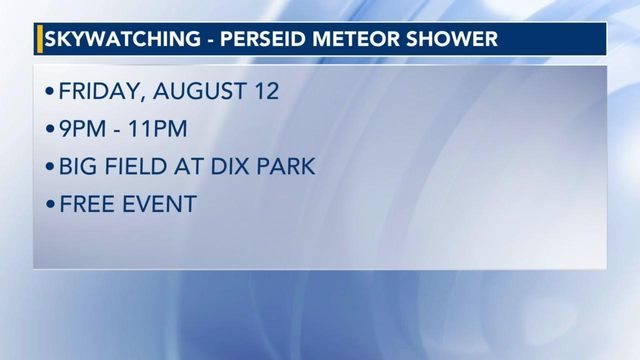Skygazers unite to view Perseid meteor shower at Dix Park
Skygazers will gather Friday night at Dix Park to watch the Perseid meteor shower.
Staff and volunteers from Morehead Planetarium & Science Center and Raleigh Astronomy Club will be on-site from 9 p.m. to 11 p.m. to help guests view the meteor shower, sometimes mistakenly referred to as shooting stars, through telescopes.
The event is free, but guests are asked to register online so staff can accommodate the number of skygazers. There will also be live music from the Triangle Sax Ensemble to set the mood.
People can gather at the big field, located at 101 Blair Drive, for the meteor shower. Free parking is available at the gravel lots on Biggs Drive and at adjacent lots.
Once cars are safely parked, headlights should be turned off to maximize darkness for the event. Cell phones and flashlights should also be used briefly or not at all.
Guests can bring blankets or lawn chairs to watch the meteor shower.
Telescope viewing tips:
- Adults should look through the telescope first before helping children (so they can help their child see the best view).
- Do not touch the telescope lenses, which can cloud easily.
- Do not let children adjust the direction of the telescope. Ask them to approach with their hands behind their back.
- Dress for the weather.
About the Persied meteor shower
The meteor shower will peak from midnight on Aug. 11 to dawn on Aug. 13 but actually runs from July 23 to August 22, according to The Old Farmer's Almanac.
Stargazers in the Northern Hemisphere will have a better chance of seeing the meteors compared to those in the Southern Hemisphere, NASA said.
Up to 40 meteors will be available per hour to people whose in the Northern Hemisphere viewing locations are far from light pollution, according to NASA.
For the best viewing chances, give your eyes at least 20 minutes to adjust to the night sky, according to EarthSky. Set aside at least an hour to see the sky because the meteors come in waves, they added.
The fragments come from the comet known as Comet Swift-Tuttle, also known as Comet109P, which takes 133 years to orbit the sun, NASA said.











